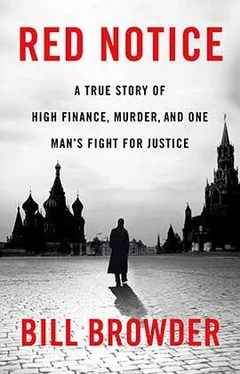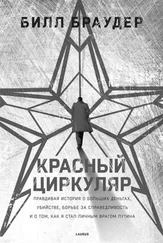The London offices of BCG were right above the Green Park Tube stop on the Piccadilly Line in the heart of Mayfair. I presented myself at reception and was shown into John Lindquist’s corner office, which resembled that of an absentminded professor, with books and papers stacked everywhere.
When I laid eyes on him, I could immediately see that John was something of an anomaly. An American, he looked like a more refined version of Chip or Winthrop in his Savile Row suit, Hermès tie, and horn-rimmed glasses. But he also had a bookish awkwardness about him. Unlike his blue-blooded juniors at JP Morgan, John had a soft, almost whisperlike voice and never made direct eye contact.
After getting settled in his office he said, «The people in Chicago tell me you want to work in Eastern Europe, right? You’re the first person I’ve ever met at BCG who wants to work there».
«Yes — believe it or not, that’s what I want to do».
«Why?»
I told him the story of my grandfather, how he’d lived in Moscow and then returned to the United States and ran for president and became the face of American communism. «I want to do something interesting like him. Something that’s relevant to me and who I am».
«Well, we’ve never had a communist working at BCG before», he said with a wink. He straightened. «At the moment, we don’t have anything happening in Eastern Europe, but I’ll tell you what. If you come work here, I promise that the first piece of Eastern European business that comes our way will be yours, right?» I quickly guessed that he said right? at the end of almost every sentence, as if it were a tic.
I couldn’t pinpoint why, but I liked John. I accepted his offer on the spot and became the first employee in BCG’s East European practice group.
I moved to London in August 1989 and rented a small house in Chelsea with two of my Stanford classmates who were also starting new jobs in London. On the first Monday in September, I hopped on the Piccadilly Line with butterflies in my stomach, ready to take on Eastern Europe at BCG.
Only, as John had explained, there wasn’t any work in Eastern Europe — not yet, anyway.
But then, in November of that year, as I sat in my tiny living room watching television with my Stanford buddies, the world shifted beneath my feet. The Berlin Wall had just come down. East and West Germans emerged with sledgehammers and chisels and began breaking it down chunk by chunk. We watched as history unfolded before our eyes. Within weeks, the Velvet Revolution took hold of Czechoslovakia, and the communist government there fell as well.
The dominoes were falling; soon all of Eastern Europe would be free. My grandfather had been the biggest communist in America, and as I watched these events unfold, I decided that I wanted to become the biggest capitalist in Eastern Europe.
My first break came in June 1990 when John popped his head in my office and said, «Hey, Bill, you’re the one who wanted to go to Eastern Europe, right?» I nodded. «Excellent. The World Bank is looking for restructuring advisers to go to Poland — I need you to put together a proposal for turning around a failing Polish bus company, right?»
«O'kay, but I’ve never done a proposal before. What should I do?»
«Go to Wolfgang. He’ll tell you».
Wolfgang. Wolfgang Schmidt . Just hearing his name made my skin crawl.
Wolfgang was a BCG manager who led some of the case teams day to day. He was widely considered one of the most difficult managers to work for in the London office. A thirtysomething Austrian, he enjoyed shouting, forced all-nighters, and chewing up and spitting out young consultants. Nobody wanted to work for him.
But if I really wanted to go to Poland, then I would have to work for Wolfgang. I had never been to his office, but I knew where it was. Everyone did, if for no other reason than to avoid it.
I walked there and found a complete mess — his room was strewn with empty pizza boxes, crunched-up papers, and piles of reports. Wolfgang was hunched over a three-ring binder, running his finger along the page. His sweaty brow glowed in the fluorescent light, and his unkempt hair shot out at different angles. His expensive English shirt was untucked, his bare and round stomach peeking out on one side.
I cleared my throat.
He cocked his head in my direction. «Who’re you?»
«Bill Browder».
«What do you want? Can’t you see I’m busy?»
I thought that he should have been busy cleaning the sty that passed for his office, but didn’t say as much. «I need to prepare a proposal for a Polish bus company restructuring. John Lindquist told me to talk to you».
«Christ», he grumbled. «Listen, Browner, start by finding résumés of BCG consultants who have experience in trucks, buses, cars — whatever you think could be related. Get as many as you can».
«O'kay, should I bring them back to you—"
«Just do it!» He returned to his binder and resumed reading.
I left his office and went to the library. Flipping through the résumé book, I saw why BCG had such an amazing international reputation. There were people with experience in every field and in every corner of the globe. A team of consultants in the Cleveland office were experts in automobile manufacturing; a group from Tokyo had worked on just-in-time inventory implementation for Japanese car companies; and some consultants in Los Angeles were specialists on operations research. I photocopied these and quickly returned to Wolfgang’s office.
«Back so soon, Brower?»
«It’s Browder, actua—"
«Yeah, yeah. Listen, there’s a couple other Polish assignments coming up as well — the guys doing those proposals will tell you what to do from here. I don’t have time for this. Now if you don’t mind..». Wolfgang flicked an open hand at the doorway, indicating I should leave.
I found the other consultants, and thankfully, they were more than happy to lend a hand. Over the next few weeks we made timetables, work plans, and compiled more information about what a great firm BCG was. When we were done, the presentations were so polished and slick that I didn’t see how we could possibly lose. We handed them over to John, who submitted them to the World Bank, and we all waited.
Two months later, Wolfgang came by my office looking uncharacteristically cheerful and put together. «Bill, pack your bags. You’re going to Poland».
«We won?»
«We did indeed. Now the real work begins».
I was elated. «Should I start calling the experts we put in the proposal to make sure they can come to Poland as well?»
Wolfgang furrowed his eyebrows. «What are you talking about? Of course not. You’re the only one who’s going to be working on this case». He clapped his hand on the doorframe, turned, and stomped off.
I couldn’t believe it. I had put all those impressive people in the proposal, and the Poles were getting only me ? A first-year associate who knew absolutely nothing about buses, or business for that matter? I was appalled, but I kept my misgivings to myself. This was my dream assignment. I was just going to have to bite my tongue and make it work.
In late October 1990, nearly a year after the Berlin Wall came down, John, Wolfgang, two other first-year associates, and I boarded a LOT [2] The Polish national airline.
Airlines flight bound for Warsaw. There, we were met by four men from the World Bank and two employees from Autosan, the troubled bus company we were supposed to help save from bankruptcy. After retrieving our luggage, we boarded one of Autosan’s buses and made our way to its headquarters in Sanok.
It was a long ride. Warsaw quickly gave way to the Polish countryside, which was in the throes of autumn; it was picturesque but also a little depressing. Poland’s communist regime had recently collapsed, and conditions on the ground were harsher than I expected. It was like stepping into a time machine set to 1958. The cars were ancient. Horses pulled carriages on the roadside. Farms were dilapidated, and the housing in towns — those ubiquitous concrete blocks in the Soviet style — were crumbling. The Poles suffered from food shortages, hyperinflation, electricity blackouts, and all sorts of other dysfunctions.
Читать дальше












